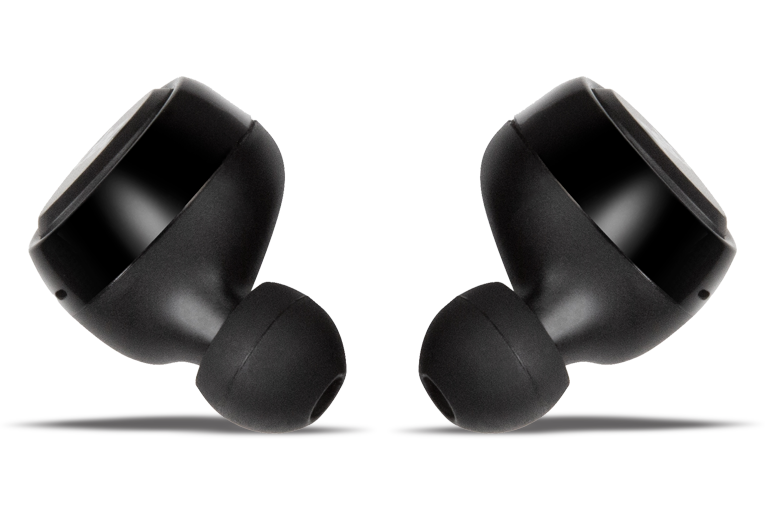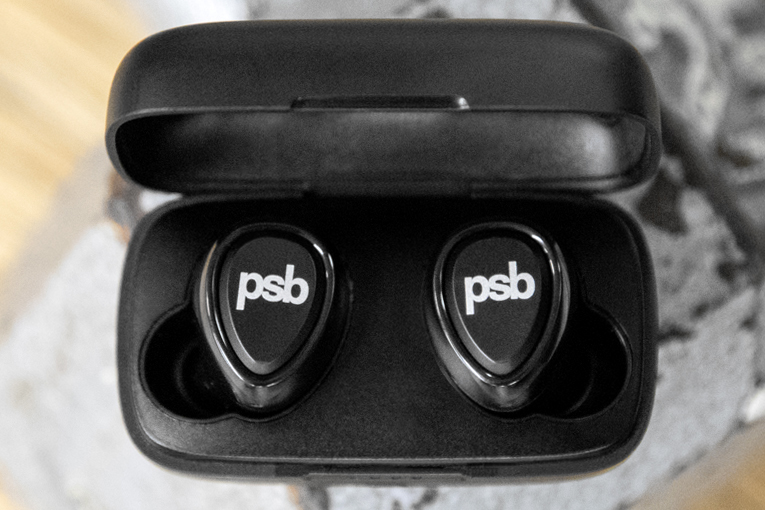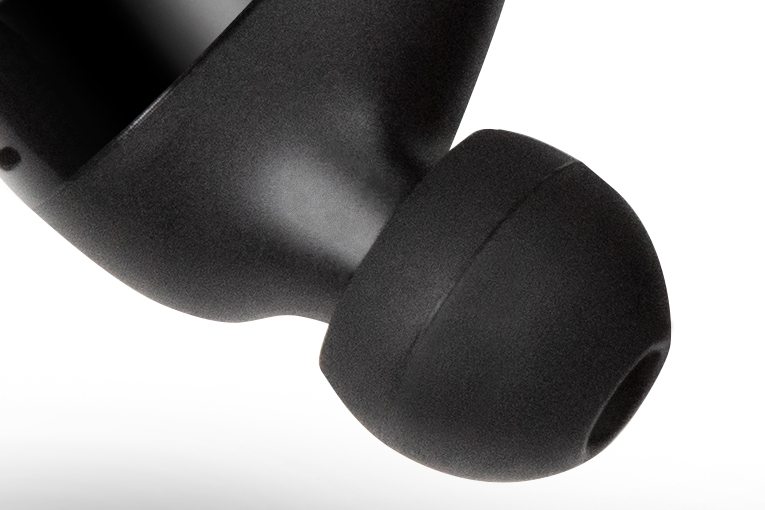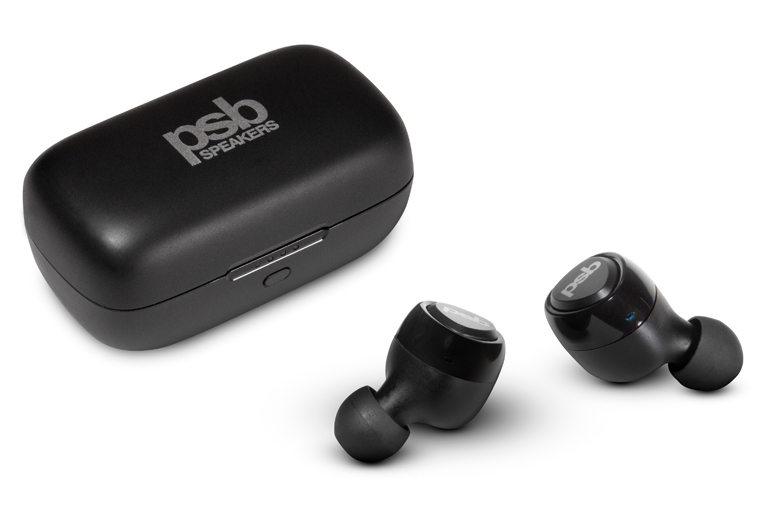Sound: 









Value: 









(Read about our ratings)
PSB is one of those companies that doesn’t get the mainstream recognition of the Boses and Sonys of the world, but among audiophiles and enthusiasts, they’re well known and widely respected. Decades of great-sounding and well-made speakers, almost all of which also measure objectively well, have done a lot to endear the company to a wide, if still vaguely niche, audience.
In the early days of the modern headphone boom, PSB’s original M4U headphones were a standout in an era of bloated, atrocious Beats and even more bloated, atrocious Beats wannabes. While the ninth iteration had some issues when I reviewed them, they sounded fantastic.

The M4U TWM are the true wireless earbuds of PSB’s lineup, featuring a 6mm “Hybrid Planar dual-driver design” while promising eight hours of music playback and IP65 water and sweat resistance. Via their app, they have Audiodo Personal Sound, which creates a custom EQ setting based on a short hearing test. With an MSRP of $199 (all prices USD), they slot in under the top-shelf options from Sony and Bose, but above the bargain-bin true wireless options that clutter the market. A sweet spot? We shall see.
In the box
All that’s in the box are a USB-A-to-USB-C cable and two pairs of silicone eartips, small and large. Medium eartips are pre-installed on the earbuds. I prefer seeing an additional size or two, as everyone’s ears are different, but having three sizes is fine at this price.
Use
It took an inordinate amount of time to get the M4U TWMs correctly connected to my phone. For some reason, they connected individually, as if two separate devices. After multiple restarts of my phone and the earbuds, including performing a factory reset as prescribed in the manual, they eventually paired together and to my phone. It’s been a while since I’ve had this much of an issue with a Bluetooth connection. I didn’t have any issues connecting to my Sony NW-A306 portable media player, so your mileage may vary.

The PSB app includes Audiodo calibration. Like most of these personal calibration features, it’s essentially a listening test—the app plays tones, and you indicate whether you hear them. You can see what the resulting tone curve looks like in the app, what frequencies it’s boosting, and if there’s any difference between your ears. If you don’t like the resulting sound, you can turn this feature off. I listened to the ’phones with Personal Sound enabled and disabled, and there wasn’t a huge difference. You can save multiple Personal Sound profiles, which is useful if you want to see how different eartips affect the sound.
There is also a five-band equalizer in the app, but it was disabled even if I turned the Personal Sound mode off. Other features in the app include a volume limiter, the length of time it takes the earbuds to power down after not receiving a signal, and when you’ll get a low-battery warning.

I really liked how small the case is—it’s even smaller than the case for my beloved Sony WF-1000XM4 earphones. That size doesn’t seem to have a big impact on overall battery life either. It’s said to be able to recharge the earbuds three times, for a total of around 24 hours of playtime.
Sound
Overall, the M4U TWMs have an airy, open sound, with a bit of bass to add some heft. I started with “I Can Do It with a Broken Heart” from Taylor Swift’s The Tortured Poets Department (24-bit/48kHz FLAC, TS–Republic / Qobuz). Through the M4U TWMs, the synth percussion on this electropop song, which shows a strong influence from producer Jack Antonoff (Bleachers), was sharp, with immediate attack. The bass beat was well controlled, though it seemed to lack lower extension. Swift’s voice had a touch of sibilance, which I didn’t love, but it wasn’t egregious.
T Bone Burnett’s The Other Side (24/44.1 FLAC, T Bone Burnett / Qobuz) is an impeccably recorded and mastered album of Americana and country blues—no surprise given its creators. On “Waiting for You,” the PSBs kept the delicate strums and plucks of the various guitars light and airy. The soundstage was nicely wide, seeming to extend out over my shoulders. Not bad for a pair of closed-back earbuds.

To see how they handled straightforward rock, I cued up “Hard to Handle” from the Black Crowes’ Shake Your Money Maker (24/96 FLAC, American Records Catalog P&D / Qobuz). The M4U TWMs did a good job with the growling guitars, and the snare hits had an immediate snap. The cymbals, however, had a slightly piercing aspect. Across most of the frequency range the TWMs offered some excellent fidelity, but the upper midrange / lower treble was boosted in a way that limited how much volume I wanted to use.
Comparison
I compared the PSBs to two similarly priced earbuds, the JBL Tour Pro 2 and the Edifier NeoBuds S. At $249.95, the JBLs are a little more expensive than the PSBs; the Edifiers ($179.99) are a little less. Both have the earbud+tail design like early AirPods, which seems quaint in this age of tiny designs like the PSBs.
The Edifiers have a lot of bass, which is one of the reasons I like them—though I’m the first to admit it’s probably a lot for most people. I cued up “Titanium (feat. Sia)” by David Guetta (Nothing but the Beat, 16/44.1 FLAC, EMI Records / Qobuz). Through the PSBs, the bass on this track was full and controlled, and fairly well balanced with the treble. Switching to the Edifiers was like adding a subwoofer. There was more bass, but it also went deeper. I liked it, but I like well-done bass. The PSBs have plenty of bass for most people. The Edifiers’ treble was smoother, with less noticeable edge and sibilance.

Switching to the JBLs, I put on “Kamera” from the 2022 remaster of Wilco’s classic Yankee Hotel Foxtrot (24/192 FLAC, Nonesuch Records / Qobuz). With the JBLs, the bass was fuller but less defined than with the PSBs. There was a lot more midrange, and the treble was far smoother. Still, this track played to the M4U TWMs’ strengths, with lots of detail in the various instruments while remaining overall well balanced. Jeff Tweedy’s voice and the mix largely avoid the frequencies the TWMs don’t like.
Conclusion
I’m torn. I wanted to like the M4U TWM earphones more than I did. I thought many aspects of their sound were really, really good. The high, open treble did wonders for the realism of acoustic instruments. While it didn’t extend super low, the bass was more than enough to do justice to dance tracks. It’s that sibilance that knocked it all back. It wasn’t a lot—I’ve certainly heard far worse—but it was enough that I never wanted to really crank up the volume. With some songs, like “Hard to Handle,” I wanted to do the exact opposite.
Which is to say, the price is about right. If you can afford to spend more, the Sony and Sennheiser options around $300 sound better. It’s a bit of a toss-up between these and the JBLs for $250, with both having their strengths and weaknesses. If you like bass, though, the Edifiers are still a bargain standout.
. . . Geoffrey Morrison
Associated Equipment
- Smartphone: Google Pixel 7
- Portable Media player: Sony NW-A306
PSB M4U TWM True Wireless Earphones
Price: $199.
Warranty: Two years.
PSB Speakers
633 Granite Court
Pickering, ON L1W 3K1
Canada
Phone: (905) 831-6555
Website: www.psbspeakers.com




